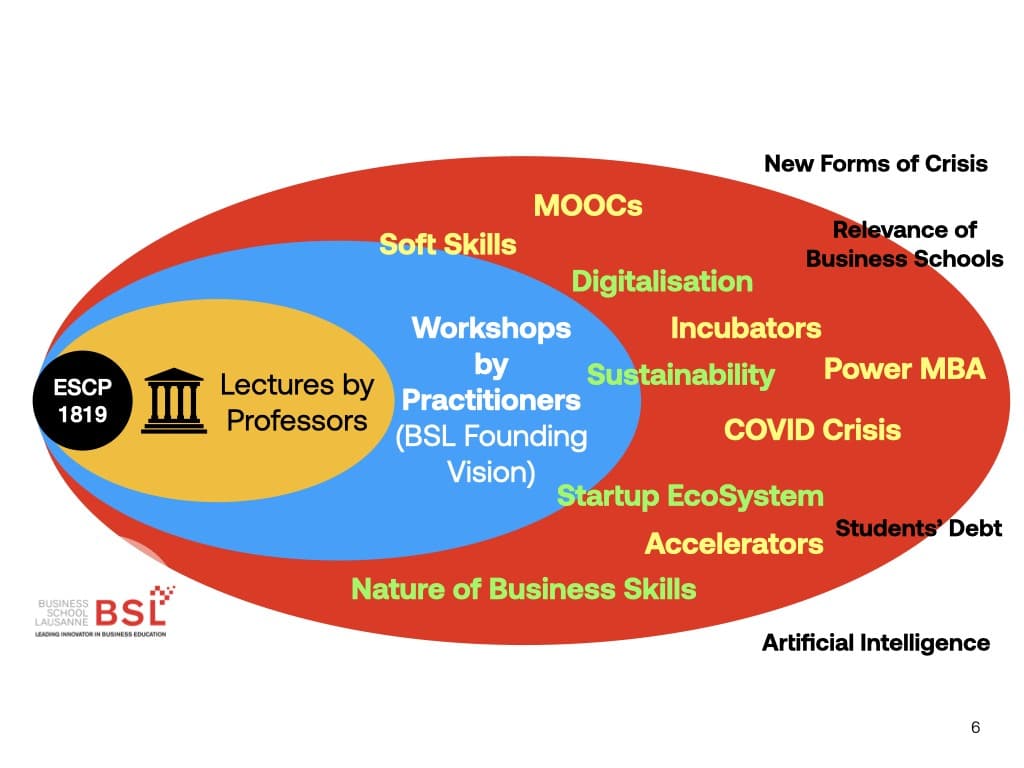
The Origins of the Business Education Universe
Historians date 1819 as the year of the first School of Business (a School of Commerce, actually) in Paris, France. Remarkably enough, one of the founders of the Ecole Supérieure de Commerce de Paris was Jean-Baptiste Zay, a pioneering thinker in entrepreneurship. Jean-Baptiste Zay actually coined the word in 1800.
In 1881 Joseph Wharton, an entrepreneur and industrialist, created the world’s first collegiate school of business at the University of Pennsylvania. Wharton School is the first Business School as we understand it today. Harvard soon followed suit and opened a Graduate School of Business Administration in 1908. By 1917, there were 30 Business Schools in the US.
Initially, Business Education was contained entirely within the academic world. In the same way as its point of origin, the whole universe was held in a small and super concentrated piece of matter.
As Business Education grew, its expansion required looking at more and varied ways to connect students with business reality.
Business Education benefited from the increasing number of practitioners delivering learning content. The vision of Business School Lausanne’s founder in 1987 was to build a Faculty exclusively of practitioners.
Today’s Accelerating Expansion of the Business Education Universe
At this present stage in history, we see an acceleration of this expansion. More and more dimensions question the established Business Schools model.
On the one hand, the pace of change in business challenges the very capacity of the Business Schools to adapt. Dimensions like sustainability, digitalization, and startup ecosystems need to find their way into the curriculum. New business skills must replace or add to the traditional ones.
On the other hand, the places where you can learn business are multiplying.
Online, MOOCs almost look like an old-fashioned way to design distance learning. More disruptive approaches already exist, like the Power MBA, where top entrepreneurs teach students directly for only a fraction of the price of a classical Business School.
Out of the Academica, incubators and accelerators offer opportunities and growing support to those who want to learn entrepreneurship by becoming entrepreneurs. In short, it is all about acquiring an entrepreneurial mindset.
This is only the tip of the iceberg. The question of student debt actually shakes the very principle of pricey Business Education.
Further in the expansion, the possibilities of artificial intelligence are still to be explored.
The Equation of Successful Business Education
In such a context, Business Schools must remember that the equation of successful Business Education reads:
Successful Business Education = (Business Expertise x Learning Experience)
Where
Learning Experience = (Approach to Learning + Practical Verification + Networking)
So, it is just as crucial for our attractivity “how” we will teach our students. As far as Business Expertise is concerned, Business Schools will not have the edge over other forms of Business Education for much longer.
The wisest move Business Schools can make is to connect to their educational dimension. It is time for them to value Learning just as much as Business Expertise. The Learning Experience is the multiplier that will make them relevant in the long run.
So, what Learning Experience can make Business Schools thrive in the Business Education Big Bang?
Experiential Learning at Business School Lausanne
At BSL, we promote Experiential Learning as the approach adapted to the needs of 21st Century students.
Experiential Learning does not only require that teaching look at real-life case studies or projects. Experiential Learning means that Learning works best as an experience that fully engages the students in a given time and space dedicated to acquiring knowledge or skills.
Do you want your students to understand collaboration? Place them in situations where they need to be collaborative and reflect on this Experience with the expertise you want them to develop.
The same goes for every topic, for both technical and social-emotional skills. Digital marketing or data mining must not just be objects described in the course. They must be trained by doing real-life projects. Leading should not be a future application of the concept of leadership. It must be a personal and immediate activity to perform.
At Business School Lausanne, Business Innovation Weeks, real-life projects in collaboration with existing or future companies, internships, and personal entrepreneurial projects have set the foundation of Experiential Learning. The growing awareness of the professors to Experiential Learning is now moving to classroom scenarios.
With Experiential Learning, Business Schools can make Learning as ubiquitous and engaging as incubators or accelerators, but with more variety and broader scope. They can also clearly explain the difference between watching/commenting on videos and complete immersion in the topic to learn.

Dr. David Claivaz
with the help of the BSL General Academic Direction and Faculty participating in the August – Experiential Learning Sessions.
